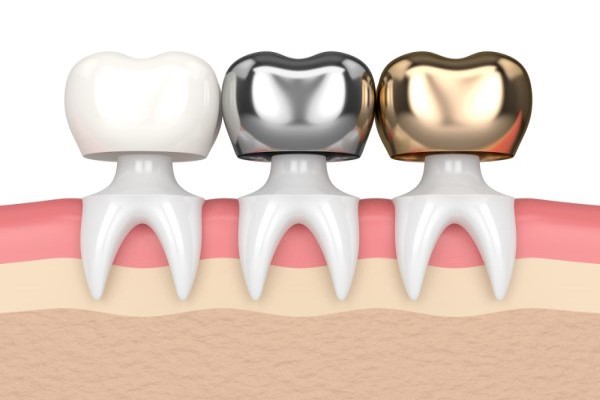Ask a Cosmetic Cosmetic – Same Day Crowns vs Traditional Crowns

When it comes time to getting cosmetic dentistry to protect damaged teeth, a patient may face the simple decision of receiving same day crowns or traditional crowns. So what is the difference? Some people may not be aware that a patient can receive a permanent crown in a single visit to the dentist.
Spotting the differences
Modern technology has made it possible for dentists to create a crown in their own office in almost no time, cutting out the need to send impressions to an external lab. Time, along with several other factors, may make same day crowns more advantageous, but it depends on each patient. A traditional crown may still be worth investing in. A comparison of the two processes can help a patient decide which route to take.
Number of office visits
As the name suggests, “same day” means that the crown is placed over a tooth during the same visit that the dentist takes an impression of the patient’s teeth. A traditional crown requires at least two office visits — one to take the impression and a second to place the permanent crown, which must be made in a lab away from the office.
Time
Receiving a crown at the dentist’s office in one appointment only takes about one hour. On the other hand, when an impression is sent to the lab, it could be several days or several weeks before the permanent crown is ready.
Temporary crowns
These are not needed at all for same day crowns since a patient receives the permanent crown immediately. Temporary crowns are necessary for the patient waiting for a crown being made at a lab.
Procedure
Anyone who has needed a tooth impression knows what it feels like to bite down on a large tray of gooey putty and wait a minute or two until the mold hardens. This same process is used to get an impression for a traditional crown. To make a same day crown, however, a dentist scans the patient’s mouth with a small camera and the 3D image is uploaded to a computer. As soon as the digital impression is ready, an in-house mill machine creates the new crown in a few minutes.
Accuracy
The use of digital scanning for a crown can make for a more accurate fit than with traditional crowns. A crown made with a mold may not be as precise due to unpredictable factors like extra saliva in the mouth.
Uses
Both types of crowns are used to fix the same problems:
- Capping and stabilizing decayed or damaged teeth
- Holding together cracked teeth
- Covering dental implants
- Topping off a root canal
Material
Most same day crowns are carved from a block of ceramic. Traditional crowns can be made of a variety of materials, such as metal, porcelain and ceramic.
Conclusion
There are advantages to each kind of crown, and the decision to get same day crowns or traditional ones may depend on a patient’s needs more than anything else. By discussing them with a dentist, patients can get their way toward better-looking teeth.
Are you considering same day crowns in the Dallas area? Get more information at https://www.highlandsdentaldallas.com.
Related Posts
Occasionally, dentures need adjustments or repairs to ensure optimal comfort and effectiveness. Your mouth changes over time, and your dentures must change with it. Adjustments and repairs can help make that possible. These involve corrections to dentures to fix issues with fit, comfort, and minor damage. Read on to learn more about the repair process.Start…
Straightening teeth is easy and convenient with Invisalign®. This orthodontic treatment offers a modern alternative to traditional braces, appealing to those seeking comfort, convenience, and discreetness. While Invisalign is highly effective for many, it is not for everyone. Understanding who makes an ideal Invisalign candidate can help patients determine if this treatment aligns with their…
Regular check-up visits are ideal for denture wearers to protect their smile and help ensure a comfortable fit for their dentures at all times. In this review, we discuss why it is imperative for patients with dentures to visit their dentist regularly.There are many things that a patient can do at home to protect their…
Dentures are the way to go if you are looking for an affordable way to replace missing teeth. They typically fall under one of two categories: partial and complete dentures. Partial dentures are recommended when a person has lost only some of the teeth in a dental arch. Full dentures are typically recommended for those…
